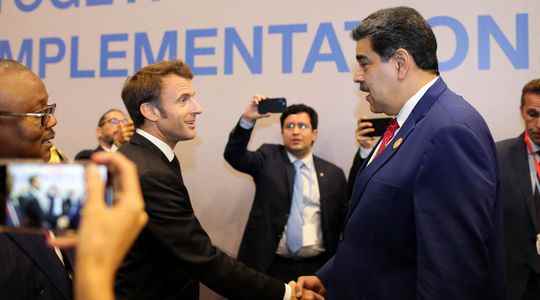Emmanuel Macron has sometimes been criticized for not having visited Latin America since the start of his first term – except once: in Argentina, four years ago. This week, the French president is catching up. On the sidelines of the COP27 on the climate in Sharm el-Sheikh (Egypt), he briefly met, on Tuesday November 8, his Venezuelan counterpart Nicolás Maduro, who presides over the destinies of an oil country that has become a dictatorship. To justify this handshake, the Elysee has indicated that it wants to relaunch negotiations between the government of Caracas and the opposition, frozen since the failure of the last process in October 2021 in Mexico City. “We are trying to create momentum for the resumption of negotiations”.
Today, it is the new Colombian President Gustavo Petro who arrives in France to meet Emmanuel Macron on Friday. On the same day, he will participate in the Paris Forum for Peace (at the Brogniart Palace) where, among other things, Colombia will be discussed. Also on Petro’s official program: a speech to students from SciencesPo (Wednesday), a meeting with UNESCO Director General Audrey Azoulay and Latin American ambassadors and an interview with Anne Hidalgo.
By receiving the ex-guerrilla and first leftist president in the history of Colombia, Emmanuel Macron will obviously have in mind that he is talking to the best “compañero” of Jean-Luc Mélenchon – who, in an interview this month at The Journal of Two Worlds, accuses the Elysée tenant of having “gouged out the eyes of 32 people [durant la crise des gilets jaunes] without ever apologizing or repenting”.
To paraphrase de Gaulle in South America in 1964, Petro and Mélenchon walk “mano en la mano”. Before the first round of the French presidential election, the former mayor of Bogota, himself in the electoral campaign, bluntly supported the leader of rebellious France. On the evening of the first round, May 7, he even regretted that “because of the sectarianism reigning in France”, Mélenchon did not reach the second round. “The damage [ainsi] caused to humanity is enormous”, did not hesitate to tweet Gustavo Petro, a tad grandiloquent. For his part, the Frenchman supported the Colombian during the presidential election of the Andean country, on May 29 and June 19, without that we know – but it is unlikely – if the local electorate has valued the opinions of Mélenchon, who sees Latin America as a source of youth and Venezuela, Cuba and any revolutionary project as sources of inspiration.
No Petro-Mélenchon meeting is on the official agenda of the Nariño Palace, the Colombian Elysée. This will not prevent the two men from seeing each other, if the (very busy) schedule allows it. “But Emmanuel Macron would hardly appreciate it,” believes a connoisseur of Franco-Colombian relations. “Paris would even have the means to dissuade him, he continues. Because every three months since 2016, France validates at the UN the document which reports on the progress of the peace agreements with the Farc guerrillas. now, French diplomacy has systematically validated it, under President Juan Manuel Santos (2010-2018) as under Iván Duque (2018-2022).If it did not do so under Petro, it would be a terrible setback for the latter on the Colombian political scene.
According to the Brazilian Lula, the Colombian Petro is “unrealistic”…
In recent years, relations between Paris and Bogota have been rather good, after the high-tension sequence at the beginning of the century when the Franco-Colombian Ingrid Betancourt was a hostage of the Farc in the Amazon jungle for six years. Under the Jair Bolsonaro era – whose relationship with Macron is notoriously abysmal – Bogotá had grown in importance as a Latin counterweight to Brazil. This will no longer be the case from the investiture of Lula, next January 1, at the head of the Portuguese-speaking giant (210 million inhabitants, the first Latin economy).
By the way, relations between Lula and Petro are not the warmest. When the two were simultaneously in the campaign, the Colombian had sought to get closer to the Brazilian … who did not bother to follow up on this contact. Worst: in a magazine interview Time last spring, Lula curtly lectured Petro, who announced that he wanted to suspend the exploration of any new gas or oil field (without stopping the exploitation of existing wells): “Petro has the right to make all the proposals that he thinks he has to do, said Lula, but in the case of Brazil, it’s unrealistic. Worldwide, it’s unrealistic. We still need oil for a while…” We can see from this that there is no more Latin solidarity than there is unity of the Arab countries, each defending its interests.
Admittedly, Lula and Petro converge on the Ukrainian question: the first scratches Zelensky; the second believes that the European Union is jointly responsible for the war; and neither condemns Putin. But the Colombian leader has more affinity with his young left-wing Chilean counterpart Gabriel Boric (36) in office since last March. The relationship between these two is excellent. Boric supported Petro when he was on campaign; he received it in Santiago once elected; and advised him to distance himself from Venezuelan Nicolás Maduro on the grounds that he does not belong to the democratic world.
This probably explains it: against all tradition, the Colombian president took three months to visit his neighbor. It was last week in Caracas. Petro, on this occasion, encouraged Maduro to resume discussions with his opposition and to return to the democratic game. An effort clearly coordinated with the United States (Petro had met Secretary of State Antony Blinken a few weeks earlier) and, also, with France, as shown by the Macron-Maduro handshake on Tuesday in Egypt.
